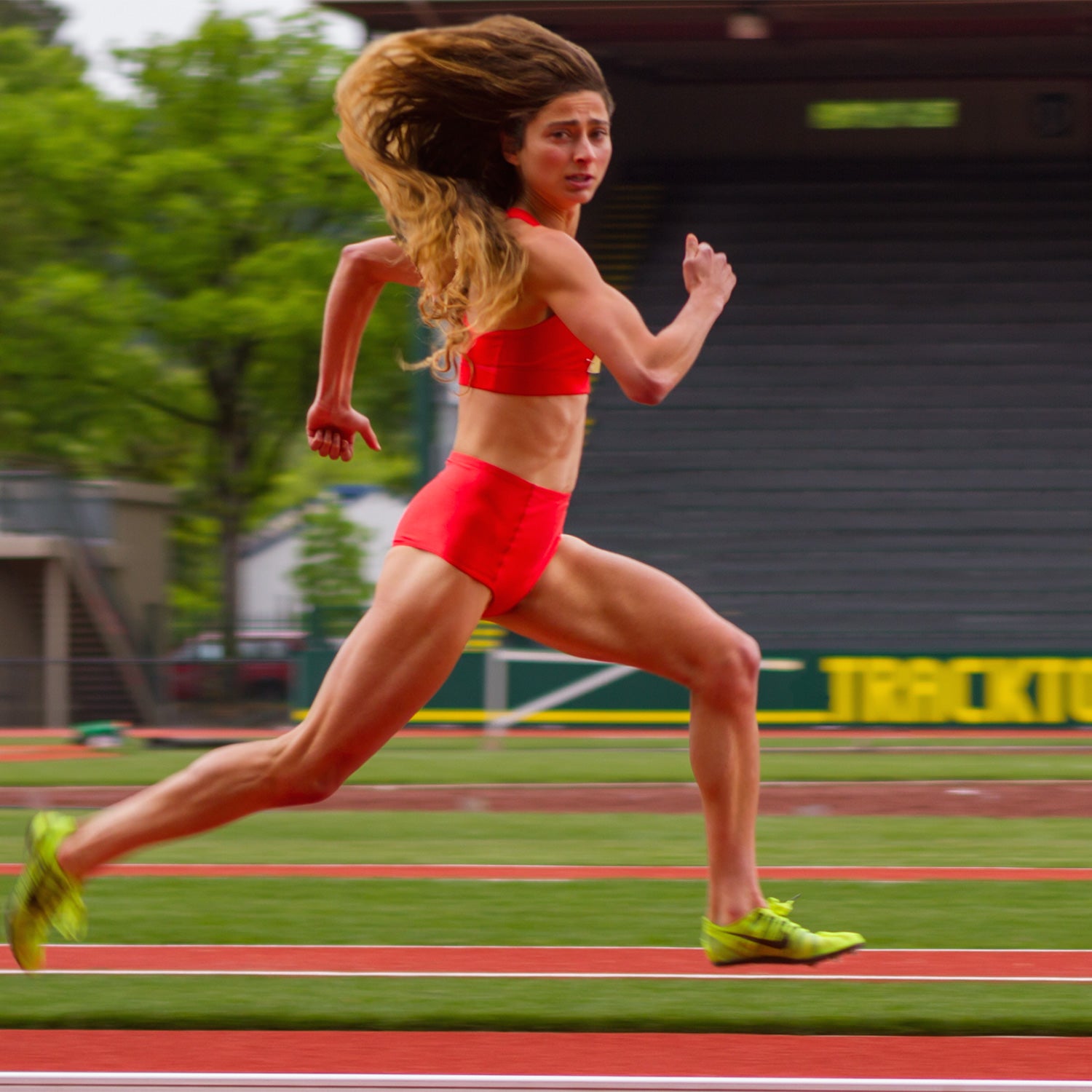Alexi Pappas has something of a cult following. Her goofy, laid-back public image combined with her whimsical, poetic online presence have captured the admiration of countless young runners. Her signature bun hairstyle has its own parody Twitter account. And the elite distance runner is just months away from competing in Rio.
The 26-year-old’s running resume is lengthy: she ran for Dartmouth College and then competed on a fifth year of eligibility at University of Oregon following her graduation. She now trains with the Oregon Track Club Elite, and last month met the Olympic standard in the 10,000 meters. Though born and raised in California, she has dual citizenship in Greece and the U.S., and will compete on the Greek Olympic team at this summer’s Games. (Her time of 31:46 handily broke the country’s national record for the women’s 10K.) Like any future Olympian, Pappas takes her training extremely seriously—however, she has no interest in being a one-dimensional athlete.
“I think it’s fun to bring something to the running world in addition to fast times,” Pappas says. So while she was training to qualify for the Games, she also co-wrote, co-directed, and starred in a feature film. On June 4, Tracktown, created with her boyfriend and creative partner Jeremy Teicher, will premier at the Los Angeles Film Festival.
Pappas' character makes passing comments about health and body image issues that are far from abnormal among female distance runners, but that rarely get airtime in mainstream sports movies.
Pappas plays 21-year-old Plumb Marigold, a runner who lives in Eugene, Oregon, and whose heart is set on making the Olympic team in the 5K. She compulsively recites inspirational quotes, with sources from Rocky Balboa to Haruki Murakami to Shakespeare (a clear side effect of Pappas’ own background as a poet), she sleeps in an altitude tent, her father’s house is littered with old trophies and ribbons, and she does everything in her power to never stray from her routine. The film takes place over the course of several days leading up to the 5K finals at the Olympic Trials, chronicling a minor injury that forces Plumb to take a day off and leads her into slightly more spontaneity than she’s ever allowed herself. A youthful romance, some complicated family dynamics, and a whole lot of neuroticism round things out.
In addition to Pappas, Andy Buckley (of The Office) and Rachel Dratch (of Saturday Night Live) play Plumb’s track-obsessed father and mostly-absent mother, respectively. Avid track fans will also recognize many familiar faces in a roster of cameos that includes Nick Symmonds, Andrew Wheating, Alysia Montaño, and other elite runners.
Tracktown is strongest when it’s directly exploring the tension of being both a young woman and a serious, competitive athlete. In one scene, Pappas admits to her coach and a doctor that she hasn’t had her period in two years, as a result of her intensive training. She also makes passing comments to her love interest, Sawyer, about the way that her running has affected her body’s development (she tells him that running has made her strong so she “looks like a boy,” and that she “knows it’s gross”). These health and body image issues are far from abnormal among female distance runners, but they rarely get airtime in mainstream sports movies.
The film also highlights the less glamorous side of being a competitive athlete in general, as Plumb must constantly choose between doing something fun and sticking to her prescribed regimen. While out on a date with Sawyer, she tells him she needs to go home to nap in her altitude tent. Later on, when he challenges her to skip out on some of her routine to go for a drive with him, she insists: “Running doesn’t work that way…I didn’t get to where I am by doing that kind of stuff.”
Some aspects of the film, like the romantic storyline between Plumb and Sawyer, can be twee at times, and Plumb’s eccentricities—like her childlike innocence and her quote-blurting habit—occasionally feel too deliberate. But for runners and running fans, these elements may be outweighed by the excitement of seeing women’s track on the big screen, with the legendary Tracktown USA as the backdrop, and iconic distance runners as extras. In fact, Teicher and Pappas point out that their access to Hayward Field and the inside of Oregon facilities was exceptional in comparison to what most other filmmakers would be allowed.
While some aspects of the film’s plot bear striking resemblance to Pappas’ actual life, she insists that the movie is not intended to be fully autobiographical. “The story of Tracktown is definitely inspired by my real-life experiences and observations as a professional runner chasing the Olympic dream, but it’s not directly based on one story or one person,” she tells me. She notes one major difference between herself and Plumb: “I wasn’t always chasing the Olympic dream every day,” she says. “There was a period of my life, in late high school and early college, when I was meandering the sea of options for a future dream.”
It’s also worth emphasizing that Tracktown isn’t a high-profile athlete’s vanity side project. Pappas and Teicher made another film together, Tall As The Baobab Tree, in 2012, and Teicher was named one of the “25 New Faces of Independent Film” by Filmmaker Magazine in 2013. Pappas studied English and creative writing at Dartmouth, as well as film and other subjects in her interdisciplinary Master’s program while at Oregon. “As indie filmmakers, one of the first questions you ask when you’re deciding what to dedicate the next few years of your life to is: ‘What film can only I make?’” Teicher says. “What’s a story that only I can tell?”
The intended audience for Tracktown feels simultaneously narrow and broad. As a former college runner myself, and as someone who’s invested in the minutiae of the running world, even I found myself wondering who the film was made for. “I’d seen some great films about running, and [some great films] about females growing up,” Pappas says when I ask her about this. “But I hadn’t seen one that specifically spoke to my experience as a female athlete chasing an Olympic dream.” But the movie isn’t aimed only at the very small subset of people who have a shot at competing on an international stage. (Teicher, after all, is only a casual runner.) “Tracktown speaks to anyone who’s trying to do something challenging and uncertain, where you wake up every day nervous—in a good way,” Pappas says.
In real life, Pappas was balancing two considerable challenges while making Tracktown. During every phase of the movie other than filming, she says, she was in “100 percent training mode.” That meant balancing 100 miles of running a week with the three-year process of making a movie.
“One of the more fun memories was when Jeremy Elliptigo’d along my side while I ran,” Pappas says. “Because there was this one part of the plot that we really needed to [talk through and] nail down… and I really needed to do my run, and it was getting dark!”
Pappas gets a little squeamish about labelling certain elements of the movie as fact or fiction, but when it comes to her character’s pre-race anxiety in the film, “That’s very real,” she says. She experiences race-related nightmares and other nervous habits in real life. (In the film, Plumb counts out the raisins in her race-day oatmeal and frantically colors in a coloring book until she breaks her crayons.) “One of my favorite coaches told me, ‘Nerves mean you care.’ And I’ve always embraced those nerves as a sign that I’m doing the thing that I want most in the world.”


